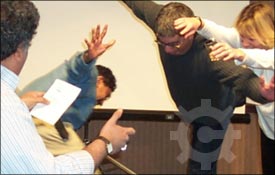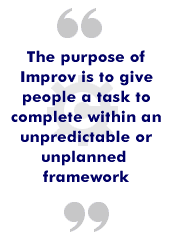Improv
Creativity and
Team building Technology
Explaining Improv is little like explaining sailing; the
actual experience is much different (and far richer) than the
description. Our favorite analogy to describe the
transformational experience of Improv is that it closely
resembles the experience of jumping off a cliff and learning
to design your wings on the way down.
Improv began, and continues today, as an organizational
technology capable of managing actors on stage and enabling
them to produce interesting and entertaining narratives
without relying on a script. We have adapted its principles
and techniques into an effective form of organizational
development that we refer to as Creativity Engineering.

Although many individuals are familiar with Improv through
the television show, Whose Line is it, Anyway?,
few know that this interactive art form has been highly
valued (originating in Europe in the mid-1500's) for its
ability to empower performers to respond immediately and
inventively to each other and their environment. Throughout
its history in the arts, Improv has been highly valued for
its ability to enable performers to respond immediately
and inventively to each other and their environment. In
addition to the arts, its principal mechanisms can be found
in almost every successful innovative endeavor from organizational
development to scientific discovery. All Improv activities
are literally saturated with the spirit of spontaneity that
is so essential for any act of creation.

Basically, the purpose of any Improv experience is to give
two or more people a task to complete within an unpredictable
and unplanned framework. The mechanics of successful Improv
and successful business essentially parallel each other.
They both engage in solving a problem while creating or
discovering something new within a given set of constraints.
In business (and in all organizational pursuits for that
matter), the constraints are often represented by money,
time, talent, resources, and the self-imposed limitations
of "conventional wisdom." In Improv, the process
is constrained by its rules and the different characteristics
inherent in individual exercises or games.
Unlike business endeavors however, at least
in the conventional view, the boundaries presented in
Improv actually open up
possibilities rather than constrain them. Students of Improv
are endowed with the abilities to act and "be in the
moment." These moments are transformed into the creation
of something that has never previously existed. Facilitating
creativity are Improv structures (hundreds of them) that
are really "mini experiments" in spontaneity and
supportive teamwork, nestled within a goal-oriented framework.
Improv structures are governed by rules that require participants
to accept and cooperate with each other, listen interactively,
and jointly advance the action of a given task while continually
supporting each other to be successful. Creativity Engineering
has developed its own proprietary structures that directly
relate to business and organizational issues.
Improv
fosters successful collaboration. In order to succeed, participants
must attend to their partners' communication and accept
and build upon each other's actions while remaining as flexible
as possible. As a result, everyone is empowered to interactively
discover his or her inherent creative potential.
Improv is fun. A common "side effect" of
most Improv experiences is laughter. It is widely accepted
that
introducing humor into the training process enhances learning
and improves retention. Importantly, Improv introduces
and
supports a brand of inclusive humor in which everyone feels
welcomed. This can be contrasted to the exclusive type
of
humor that marginalizes individuals or groups and often
has serious repercussions in the workplace. At the conclusion
of any Improv training, participants feel lighter, healthier,
and more productive.
Finally, Improv is about success. Because every idea is
valued and the rules insure creative collaboration, each
person can have an experience of creative mastery. Everyone
must feel successful, or it's not Improv.
Find out More:
For specific program
descriptions please visit the Training
pages. |

